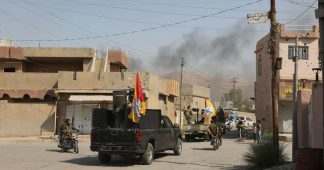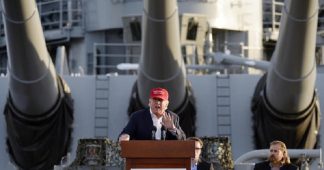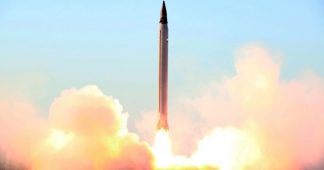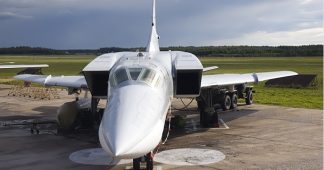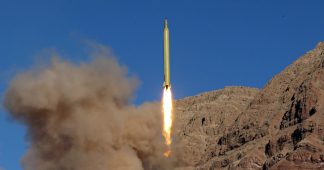He warned that senior US officials, particularly those with a military background, “will do everything short of war against Iran”. They had convinced themselves that Iran’s clerical government was weaker than was really the case. “They believe that they just have to kick the system and it will collapse,” he said. This wishful thinking has been encouraged by the protests that have broken out in Iranian cities since 28 December.
US-Iran tensions increased last Friday when President Donald Trump said he had signed a waiver on the reimposition of draconian US sanctions on Iran for the last time. He would not do so when the issue comes up again in 120 days unless the nuclear deal agreed with Iran two years ago is substantially modified, something that is unlikely to happen. The uncertainty about sanctions has already cut the economic benefits to Iranians stemming from the agreement because foreign banks and companies do not want to risk spending money doing business in Iran and then find that they have to stop because of sanctions.
Nobody in the region is certain about how seriously they should take Mr Trump’s belligerent rhetoric, but Iran will inevitably take precautionary measures to guard against a worst-case scenario. “The Iranians are under the impression that others want to topple them and this is understandable,” the Iraqi Prime Minister Haider al-Abadi told The Independent in an interview in Baghdad last October. “To protect themselves they have to fight outside their borders.” They generally do this through the use of proxies and skilful manipulation of local forces.
Iraq has been enjoying its least violent period since the US and British invasion of 2003 – but the unaccustomed peace is still fragile, as was shown on Monday when two suicide bombers killed 38 people and injured dozens more in an explosion in a market in Baghdad. This was the worst attack in the capital since the Iraqi security forces, backed by US airpower, captured Mosul in July after a nine-month siege – a major victory over Isis.
The US and Iranian relationship in Iraq has long been an unstable mixture of open rivalry and hostility, combined with covert and grudging cooperation. Both Mr Abadi and his predecessor as prime minister, Nouri al-Maliki, were approved by both Washington and Tehran before being appointed.
This curious relationship between Iran and the US is tenuous, depending on both countries having similar aims, a recent example being the war against Isis. Iraqi governments try to balance between the two powers without becoming wholly dependent on either.
The US periodically hopes to establish a pro-American government in Baghdad, but the former Iraqi minister said that in present circumstances Iran would be determined, more than ever, to prevent this happening. He believed that American officials underestimate Shia solidarity and exaggerate the significance of the very real differences between Shia clerical leaders in the two countries. “At the end of the day the marjaiya [the vastly influential Iraqi Shia hierarchy] would stand with Iran,” he said.
A further complication arises if the US seeks to reimpose severe economic sanctions on Iran, because Iraq will become a centre for Iranian commerce and banking transactions. On the border between Iran and Iraqi Kurdistan there are three legal crossings and 13 illicit ones, according to the Iraqi interior ministry.
The US can stir the pot in Iraq but not achieve any decisive breakthrough in rolling back Iranian influence. In Syria, the American position is even more complicated because it relies, for leverage, on its alliance with the Syrian Kurds – the two million-strong minority that controls a great swathe of territory across northern and eastern Syria. The US has about 2,000 specialist soldiers in Syria, but its military strength depends on the use of airpower in support of Kurdish ground troops who belong to the Syrian branch of the Kurdistan Workers’ Party, which has been waging a guerrilla war in Turkey since 1984.
This is not a stable political or military platform from which the US could try to diminish Iranian influence in Syria. Alliance with the Syrian Kurds means hostile relations with Turkey, as shown in the last few days when the US said it was supporting a 30,000-strong force to patrol the Syrian-Turkish border. Turkish President Recep Tayyip Erdogan furiously denounced the US move, saying “a country we can call an ally is insisting on forming a terror army on our border. What can that terror army target but Turkey? Our mission is to strangle it before it is even born.”
The US does not appear to have decided on its long-term policy in Syria. It could use its local assets to try to keep President Bashar al-Assad weak, which might be feasible, but it would be at the cost of chaos in at least part of Syria – and Iran has shown itself to be more adept than the US at exploiting chaotic situations.
Some observers say reassuringly that Mr Trump’s aggressive rhetoric is frequently accompanied by prudent action and often by no action at all. But in the Middle East threats are taken seriously and, even when empty, may provoke a brutal counter-reaction. This is what happened in 2003 when US Neo-Conservatives spoke of following up the capture of Baghdad with regime change in Tehran and Damascus. The Iranians and Syrians became determined that the US and Britain would never stabilise their occupation of Iraq. If Mr Trump does succeed in capsizing the Iran nuclear deal, the US may soon regret reigniting a series of conflicts likely to end badly for them.

